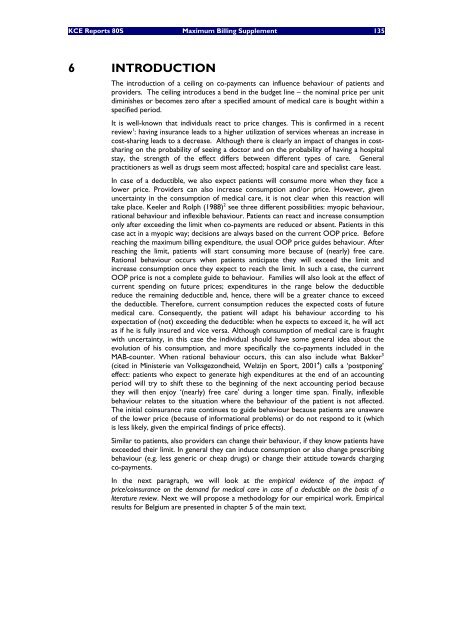Download het supplement - KCE
Download het supplement - KCE
Download het supplement - KCE
Create successful ePaper yourself
Turn your PDF publications into a flip-book with our unique Google optimized e-Paper software.
<strong>KCE</strong> Reports 80S Maximum Billing Supplement 135<br />
6 INTRODUCTION<br />
The introduction of a ceiling on co-payments can influence behaviour of patients and<br />
providers. The ceiling introduces a bend in the budget line – the nominal price per unit<br />
diminishes or becomes zero after a specified amount of medical care is bought within a<br />
specified period.<br />
It is well-known that individuals react to price changes. This is confirmed in a recent<br />
review 1 : having insurance leads to a higher utilization of services whereas an increase in<br />
cost-sharing leads to a decrease. Although there is clearly an impact of changes in costsharing<br />
on the probability of seeing a doctor and on the probability of having a hospital<br />
stay, the strength of the effect differs between different types of care. General<br />
practitioners as well as drugs seem most affected; hospital care and specialist care least.<br />
In case of a deductible, we also expect patients will consume more when they face a<br />
lower price. Providers can also increase consumption and/or price. However, given<br />
uncertainty in the consumption of medical care, it is not clear when this reaction will<br />
take place. Keeler and Rolph (1988) 2 see three different possibilities: myopic behaviour,<br />
rational behaviour and inflexible behaviour. Patients can react and increase consumption<br />
only after exceeding the limit when co-payments are reduced or absent. Patients in this<br />
case act in a myopic way; decisions are always based on the current OOP price. Before<br />
reaching the maximum billing expenditure, the usual OOP price guides behaviour. After<br />
reaching the limit, patients will start consuming more because of (nearly) free care.<br />
Rational behaviour occurs when patients anticipate they will exceed the limit and<br />
increase consumption once they expect to reach the limit. In such a case, the current<br />
OOP price is not a complete guide to behaviour. Families will also look at the effect of<br />
current spending on future prices; expenditures in the range below the deductible<br />
reduce the remaining deductible and, hence, there will be a greater chance to exceed<br />
the deductible. Therefore, current consumption reduces the expected costs of future<br />
medical care. Consequently, the patient will adapt his behaviour according to his<br />
expectation of (not) exceeding the deductible: when he expects to exceed it, he will act<br />
as if he is fully insured and vice versa. Although consumption of medical care is fraught<br />
with uncertainty, in this case the individual should have some general idea about the<br />
evolution of his consumption, and more specifically the co-payments included in the<br />
MAB-counter. When rational behaviour occurs, this can also include what Bakker 3<br />
(cited in Ministerie van Volksgezondheid, Welzijn en Sport, 2001 4 ) calls a ‘postponing’<br />
effect: patients who expect to generate high expenditures at the end of an accounting<br />
period will try to shift these to the beginning of the next accounting period because<br />
they will then enjoy ‘(nearly) free care’ during a longer time span. Finally, inflexible<br />
behaviour relates to the situation where the behaviour of the patient is not affected.<br />
The initial coinsurance rate continues to guide behaviour because patients are unaware<br />
of the lower price (because of informational problems) or do not respond to it (which<br />
is less likely, given the empirical findings of price effects).<br />
Similar to patients, also providers can change their behaviour, if they know patients have<br />
exceeded their limit. In general they can induce consumption or also change prescribing<br />
behaviour (e.g. less generic or cheap drugs) or change their attitude towards charging<br />
co-payments.<br />
In the next paragraph, we will look at the empirical evidence of the impact of<br />
price/coinsurance on the demand for medical care in case of a deductible on the basis of a<br />
literature review. Next we will propose a methodology for our empirical work. Empirical<br />
results for Belgium are presented in chapter 5 of the main text.

















